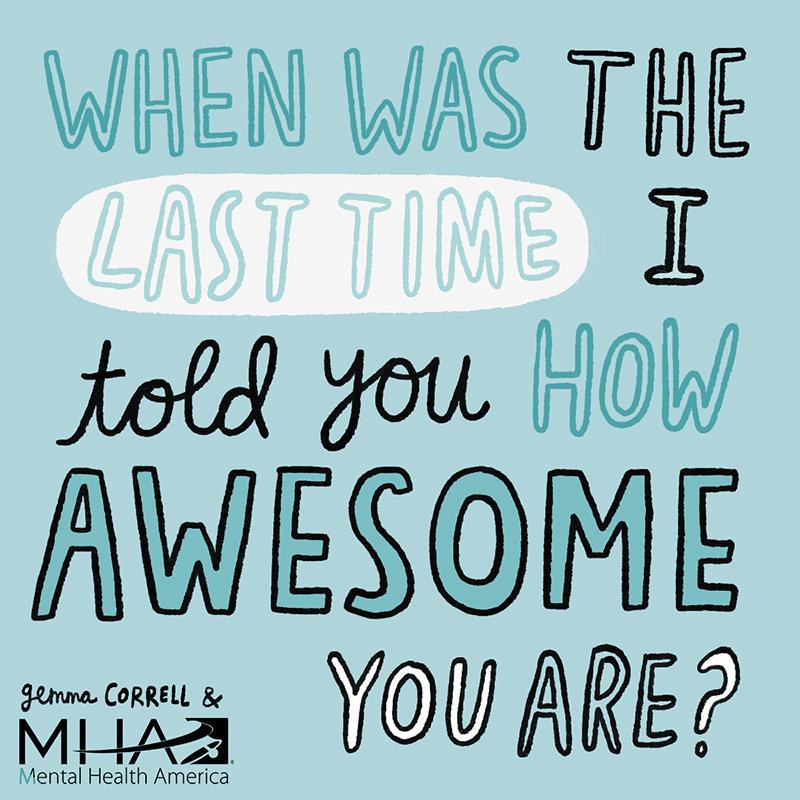The #4Mind4Body Challenge

Days 1-7
Days 8-14
Days 15-21
Days 22+
Day 1
You’ve probably heard the sayings, “You are what you eat,” or, “Garbage in, garbage out.” So our first #TastyTuesday challenge will be to look at the types of foods we are used to eating.
Certain foods provide the nutrition your brain and body need to function at their best. Diets that incorporate omega 3 fatty acids, b vitamins, folic acid, vitamin D, prebiotics and probiotics help improve mood, reduce inflammation, and reduce signs of depression; while diets high in processed, sugary, and fatty foods do the opposite.
Check out our Mental Health Grocery List below and post with #4mind4body to let us know what from this list you already have in your kitchen.
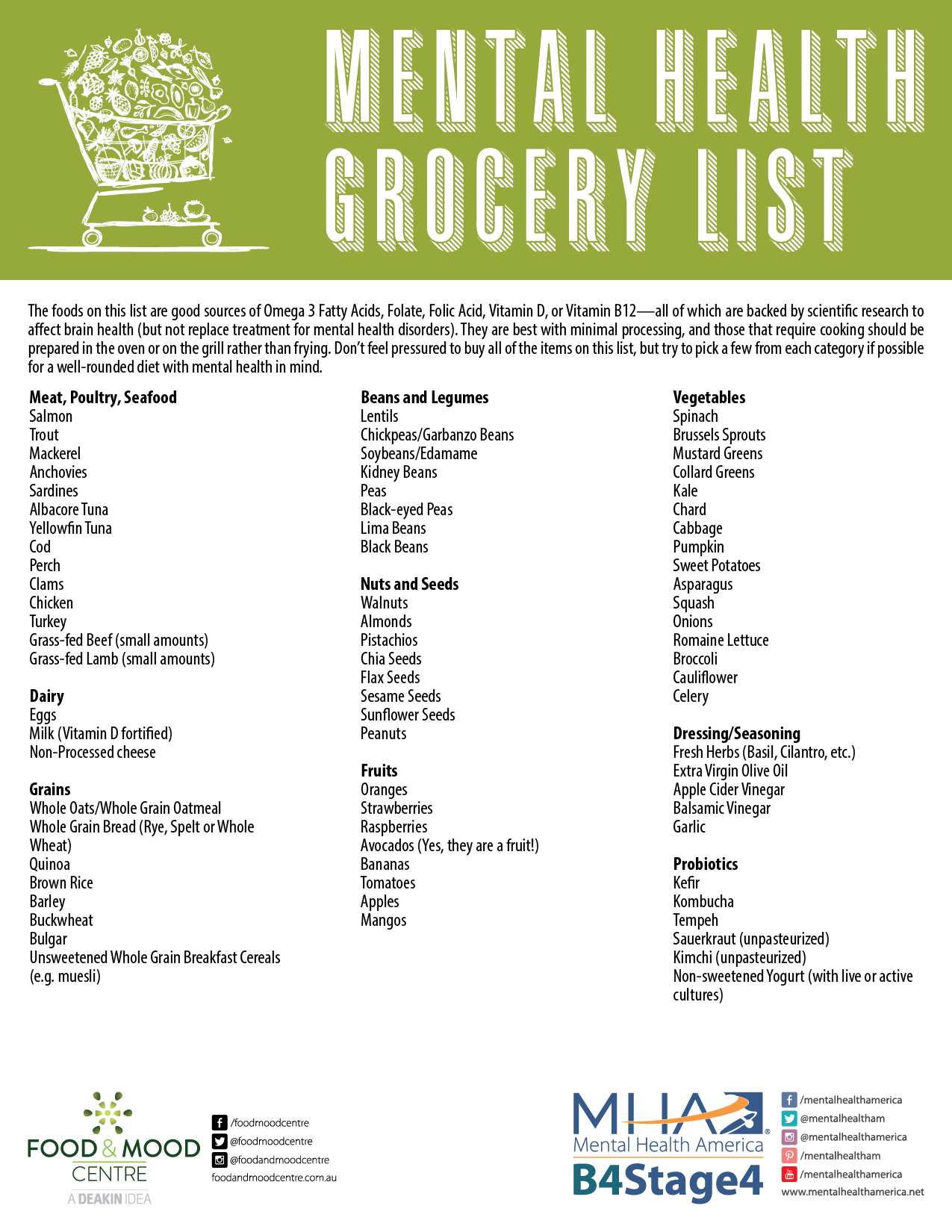
Download the Mental Health Grocery List as a printable PDF.
Learn more about how diet and nutrition affect the mind and body here.
Day 2
Wednesdays are about wellness in the workplace #WorkplaceWednesday.
Nowadays so many jobs (although not all of them) involve sitting at a computer, behind a desk—which can make it hard to establish relationships with co-workers, and even harder to incorporate physical activity into your day.
Give your eyes (and your back, and your whole body for that matter) a break from the screen. Today we want you to take a walk on your break. If you need some peace and quiet, take a stroll by yourself. If you feel like company, ask a co-worker to join you.

Track how far you’ve walked with a step tracking app on your phone, wearable device like a Fitbit, or by tracing your route here. Post with #4mind4body to let us know how many steps you took or how far you went.
Day 3
It’s #ThoughtfulThursday.
Research indicates that those who consistently help other people experience less depression, greater calm, fewer pains and better health. They may even live longer.
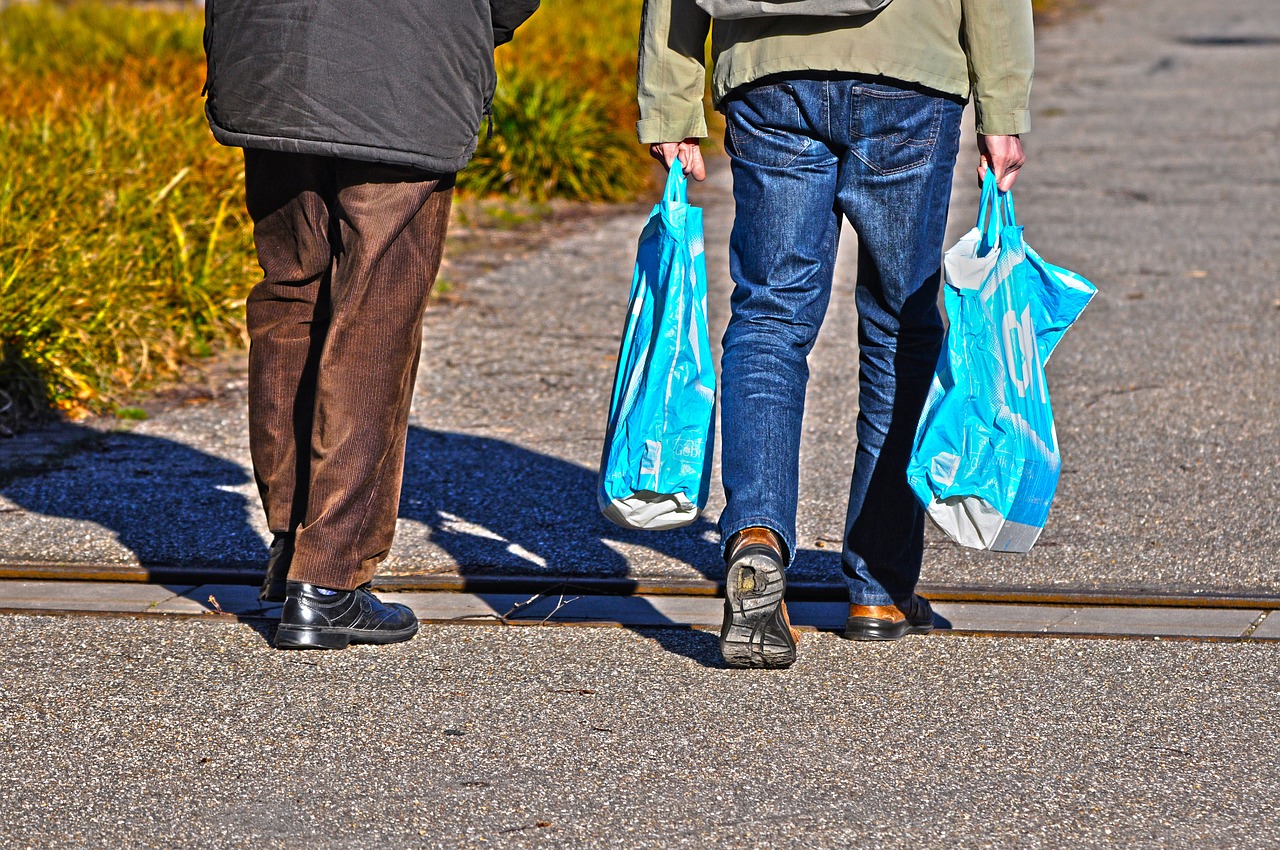
Today we’re challenging you to do at least one random act of kindness – something to put a smile on someone else’s face. Here are some ideas to get you started:
- Pay the toll for the person behind you on your commute
- Hold the door open for someone. This may be especially helpful for someone who is mobility impaired, has their hands full or is with small children
- Call an old friend or family member that you haven’t talked to in a while
- Help an elderly friend or neighbor run errands or do housework
- Buy a cup of coffee for someone
- Clean up leaves or garbage on your street
Post with #4mind4body to let us know what your random act of kindness was.
Day 4
Yoga can improve mental health in general and may help relieve symptoms of mental health disorders like depression, anxiety, attention-deficit-hyperactivity disorder (ADHD), post-traumatic stress disorder (PTSD) and schizophrenia.
Aside from its benefits for your mental health, it’s a great way to stretch and strengthen your muscles.
We’ve partnered with Annie Shiel, yoga instructor and co-founder of True U —an organization that empowers teens through yoga, true talk, and mindfulness—to show you two short yoga routines.
As long as you’re healthy enough to do exercise, give one of these videos a try. Show us how you did on #FitnessFriday: post a post-yoga selfie with #4mind4body and let us know how it made you feel. Namaste!
Learn more about how exercise benefits mind and body.
For more from Annie, you can find her on Facebook or Instagram @annieshiel. To learn about True U, check them out on Facebook or Instagram/Twitter @trueuofficial.
PS – Happy Star Wars Day. Here are some words of wisdom about dealing with mental health problems from the late Carrie Fisher. May the Fourth be with you.
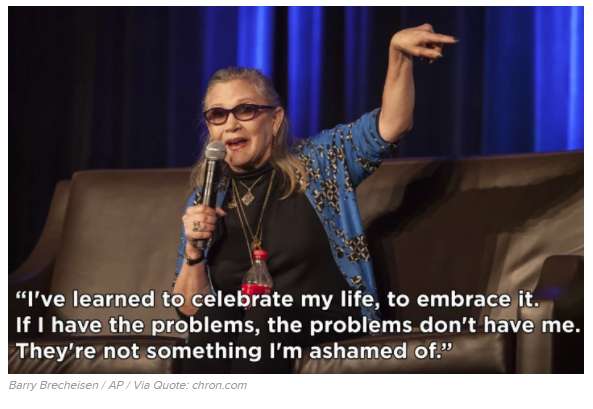
Day 5
Happy Cinco de Mayo!
Every Saturday this May our challenges will focus on how to be stress-free (or at least how to reduce stress). This #StressFreeSaturday we’re looking at music as a stress reliever.
Musician Brandon Fox uses music as a stress reliever and his song writing has helped him recover from a substance use disorder. Hear what he has to say in the video below, and check out his album, “Remedy,” on ITunes or Google Play (Brandon suggests the ‘Long Time Coming’ & ‘Bring Me Down’ tracks for de-stressing). 100% of album proceeds benefit the work of Mental Health America.
We want to know what your favorite de-stressing songs are. Post a link to your favorite song or music video with #4mind4body.
Here is a Spotify playlist of MHA staff’s favorite songs for de-stressing.
Day 6
It’s #SleepWellSunday.
A good night’s sleep can often be the first thing we sacrifice to make sure all of our daily demands are taken care of, but sleep is about so much more than just shutting your eyes. When we don’t get enough sleep, our bodies don’t have time to repair organs and flush toxins from our brains, which can increase the risk of developing high blood pressure, heart disease, diabetes, and symptoms of mental health disorders.
In fact, people with mental health disorders experience sleep problems at a much higher rate than those without mental health disorders.
Depending on your age, the amount of sleep you need varies.
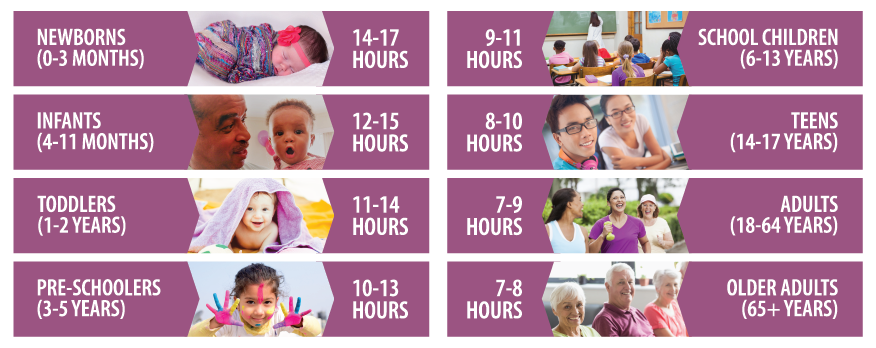
After tracking our sleep patterns for the last few days, we figured that MHA staff get an average of 7 hours and 32 minutes of sleep per night (but we also wake up a handful of times each night).
Today’s challenge is all about tracking your sleep to figure out if you are getting enough. Starting tonight we want you to track how much sleep you’re getting each night. Post tomorrow with how much sleep you got and whether or not you’re feeling well-rested in the morning (don't forget to use #4Mind4Body).
Ways to Track Your Sleep:
- The old-fashioned way: Look at the clock before you fall asleep and make a note (mentally or on paper) of when it was, then when you wake up, do the math and figure out how many hours of sleep you got.
- The wearable way: Wearable devices can help you track not only how many hours of sleep you are getting, but how much time you spend in different sleep stages based on your heart rate. Many models of Fitbit have the ability to track sleep, and the Apple Watch can track sleep when you use it with apps like Sleep Tracker (get it here for $1.99). Other lesser known wearable devices like the Jawbone Up, Garmin VivoSmart HR+, Basis Peak, Misfit Shine 2, Leaf Urban (which can be worn as a bracelet or on a necklace) and the Oura Ring (it’s a ring for your finger) also have sleep tracking functions.
- The smart phone way: Staring at your phone for long period of time before bed can mess up your sleep, but you don’t even have to look at your phone for it to be a useful tool for tracking your sleep. Free apps like SleepBot, Sleep Better sleep cycle alarm clock, Sleep Cycle alarm clock, and Sleep Time are able to track sleep patterns based on the movements and sounds you make while you are snoozing when placed either on a table next to your bed or on your bed beside your pillow.
Get more information about how sleep affects the mind and body.
Day 7
Mondays this May will be focused on mindfulness #MindfulMonday. But what exactly is mindfulness, and how does one practice being mindful?
We’ll answer these questions and guide you through a short mindfulness exercise in a podcast created especially for MHA by Ananda Leeke – artist, author, Reiki master practitioner, professional speaker, and mindfulness and yoga teacher.
Tell us – is this your first time doing a mindfulness exercise, and what does mindfulness mean to you? Be sure to post with #4mind4body.
For more short mindfulness and meditation exercises, check out Ananda’s #ThrivingMindfully podcast series on SoundCloud.
Day 8
It’s #TastyTuesday again!
Nutritious foods don’t have to break the bank—or go bad in the fridge before you have time to eat them.
At MHA, we did our own experiment to figure out where we could save money when trying to eat with mental health in mind. Check it out.
We want to know how you watch your wallet when you’re buying healthy food. Share your tips for saving and don’t forget to use #4mind4body.
Day 9
This #WorkplaceWednesday we’re working on water consumption.
While it’s tempting to load up on coffee and soda during the workday to stay alert (err…caffeinated), research shows that even mild dehydration can cause fatigue, difficulty concentrating, and mood changes, as well as physical effects like thirst, decreased or dark urine, dry skin, headache, dizziness and/or constipation. Furthermore, too much caffeine can trigger symptoms of anxiety.
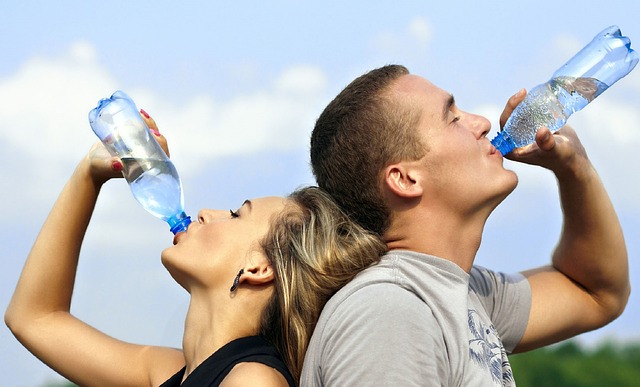
That’s why today’s challenge is to drink a gallon of water throughout the workday (don’t chug it all at once – it can be dangerous).
We want to see your empty cups or water bottles (don’t forget to recycle)! Post with #4mind4body.
Need a sweet cup for your water? Buy one in the MHA Store.
Day 10
This #ThoughtfulThursday is about supporting charities!
Studies have shown activity in the brain’s pleasure centers and other benefits to mental health occur when people donate or volunteer with charitable organizations.
Here are some ideas for how you can provide support:
- Use smile.amazon.com when buying items on Amazon and select a charity to receive a portion of each purchase you make.
- Sign up to volunteer your time with a nonprofit organization. It might involve working at an event, doing office tasks, or rolling up your sleeves and getting your hands dirty—whatever you do, it’s a big help. Go to volunteermatch.org to find opportunities to get involved.
- Donate items instead of money. Depending on the charity you chose to support, they may need physical items like toiletries and hygiene supplies, blankets or clothing.
- Raise money. Facebook is a great tool that anyone with an account can use to raise money for causes they care about. Learn how here.
- Fill out an online petition or write to your congress person in support (or against) an issue that is important to you. Check out MHA's most recent Action Alert.
Thank you to the following groups and people, who are just some of those supporting MHA with their time and talents:
- Brandon Fox
- Rich Aucoin
- Derek Hess
- Five Fifty Fifty
- Pura Vida Bracelets
- Abrante & Signora
- Legacy Supply Co
- TOBI
- Brooke Hilton
- Ninja Theory
- MyLife MyAdventure
- PEAR cards
- Mela Comfort
Tell us which charity you’ve decided to support and how you’re going to help by posting with #4mind4body.
If you want to support MHA, make a donation here or learn about other ways to get involved.
Day 11
Happy #FitnessFriday!
Exercise can help control weight, improve your chances of living longer, strengthen your bones and muscles, and benefit your mental health.
A workout doesn’t have to be done for hours at a time and you don’t need to use gym equipment.
Cheryl Hairston, Assistant Athletic Trainer at Florida Southern College, is here to show you 5 exercises you can do at home to get in shape.
Try out these exercises and share a sweaty selfie with #4mind4body when you’re finished.
Day 12
You’re probably pretty in-tune to the things that stress you out, but when the people around you are stressed it can have a negative effect on your environment and may end up impacting your mood as well.
Helping others is good for your mental health and stress reduction in general is good for everybody.
Check out this blog about stress reduction from our partners at the Born This Way Foundation.
Take a moment to think about who in your life has been under a lot of stress lately and what simple things you might be able to do to help lighten their load. Let us know what you did by posting with #4mind4body.
Day 13
Happy Mother’s Day to all the moms out there—it’s #SleepWellSunday and we hope you get to sleep in today. You deserve a break!
Part of establishing good sleep habits means setting up a healthy sleep environment and a bedtime routine.
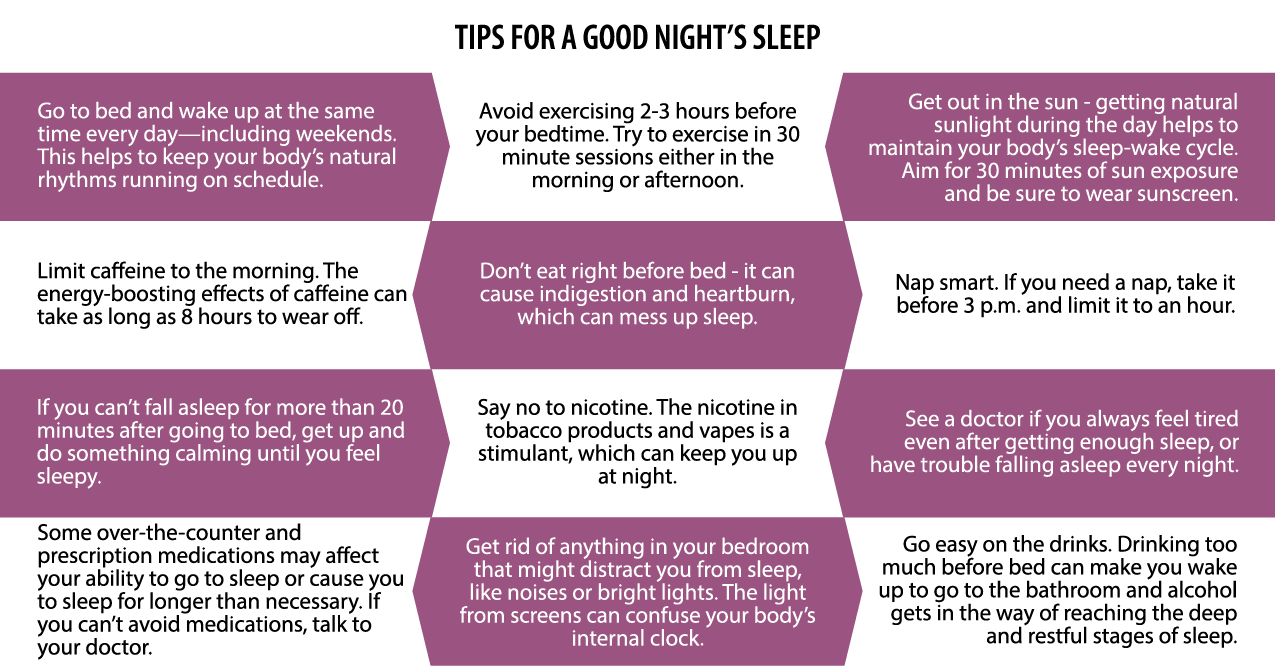
Share what one thing makes you most comfy and ready for bed by posting with #4mind4body. (Please, no pictures in your birthday suit.)
Day 14
Being mindful isn’t just about meditation exercises. It’s also about being aware of how your mind and body are feeling.
Be mindful of your mental health by taking a screen at mhascreening.org. It’s free, anonymous, and confidential.
Raise awareness and help people identify mental health problems #b4stage4 by posting a link to MHAScreening.org with #4mind4body.
Day 15
Half of May has gone by already, and we’re thrilled with how many of you have been participating in the #4Mind4Body Challenge!
Today for #TastyTuesday we’re sharing a day’s worth of recipes for nutritious and delicious meals to benefit mind and body from Dr. Drew Ramsey, psychiatrist, author, farmer, and board member of our partner organization, The Food & Mood Centre.
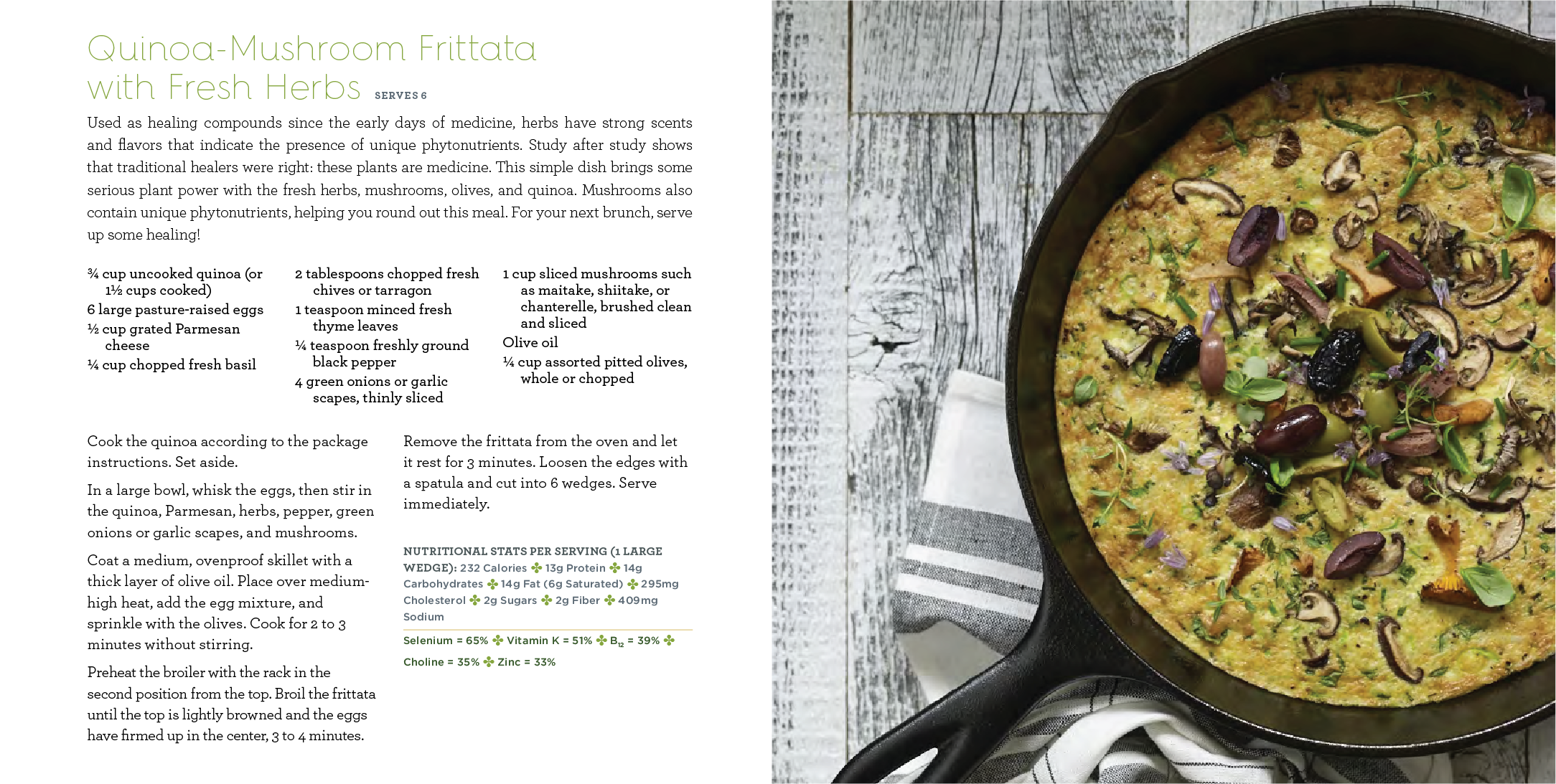
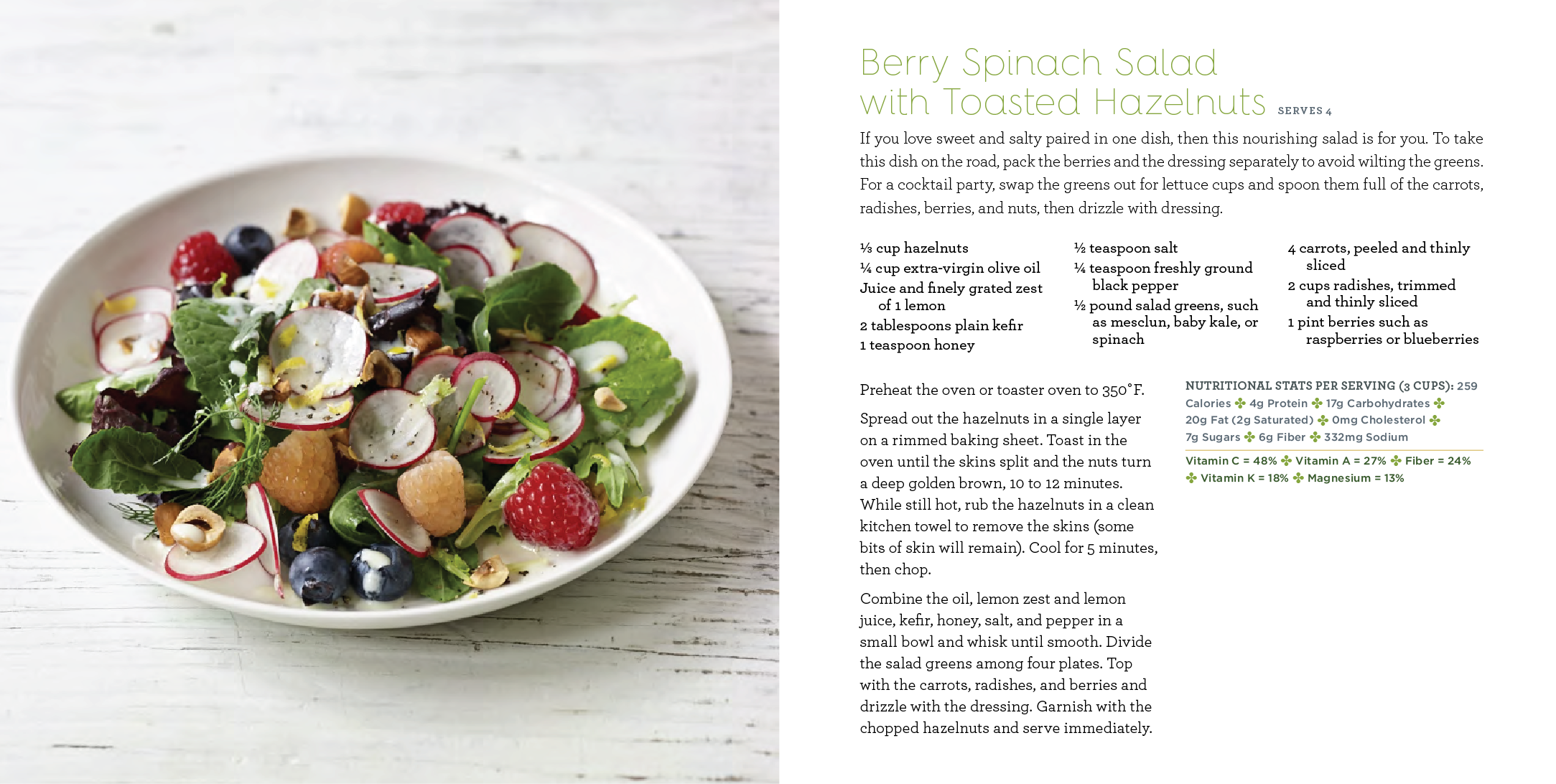
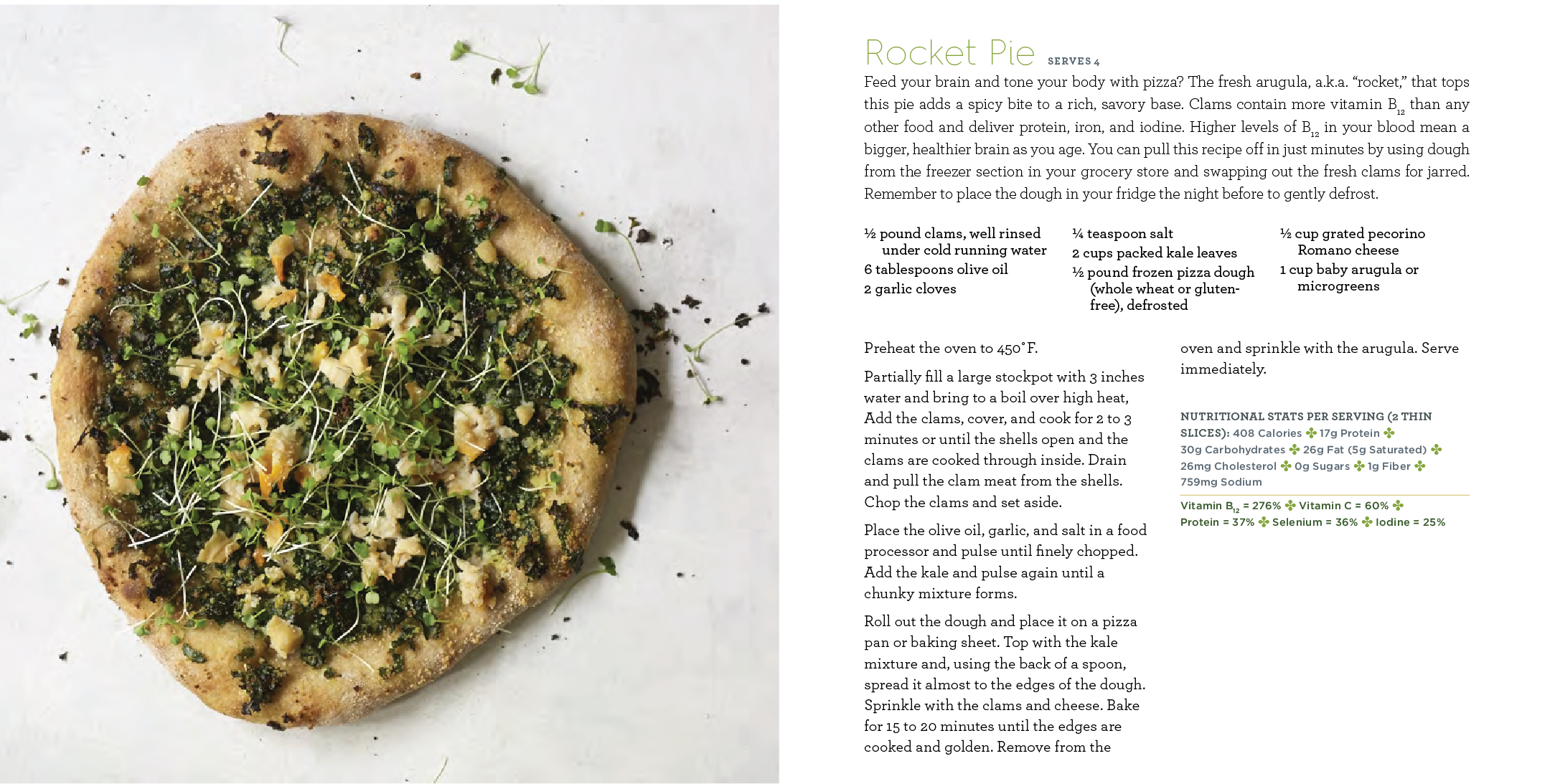
Print the recipes by downloading this pdf.
For more recipes, check out his book Eat Complete or purchase his e-course, Eat to Beat Depression.
Share the recipe for your favorite healthy dish or try one of our recipes and show us how it turned out by posting with #4mind4body.
Day 16
It’s #WorkplaceWednesday!
In MHA’s “Mind the Workplace” Workplace Health Survey, 66% of the 17,000+ respondents said they did not feel like they trusted their team or coworkers to support their work activities. This perceived lack of support contributed to higher levels of workplace stress, isolation, and overall dissatisfaction with one’s job.
Today’s challenge is about building relationships with your coworkers—make some time today to get to know who your coworkers are outside of the workplace. This might mean going out to lunch or getting coffee together or chatting for a few minutes between tasks or meetings.
If you need some help getting a conversation started, our partners at PEAR have shared a few of their cards to get you going.
Want more? Visit pearcards.com for a full deck. A portion of your purchase will help benefit MHA.
Send us a pic or share how you got to know your coworker(s) with #4mind4body.
Day 17
This #ThoughtfulThursday is about gratitude.
By recognizing and appreciating the goodness in your life, you can improve your mood by focusing on the things you already have rather than the things you lack. One study even found that people who practiced gratitude on a daily basis even exercised more!
Gratitude journals are a great way to track the good things in your life.
Old-Fashioned Paper Journals
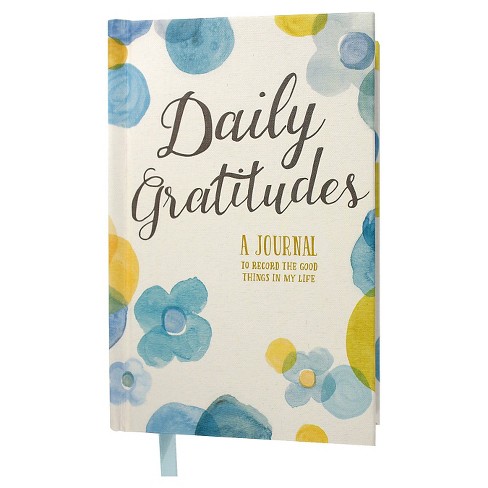 Get this one from Target for $9.99
Get this one from Target for $9.99
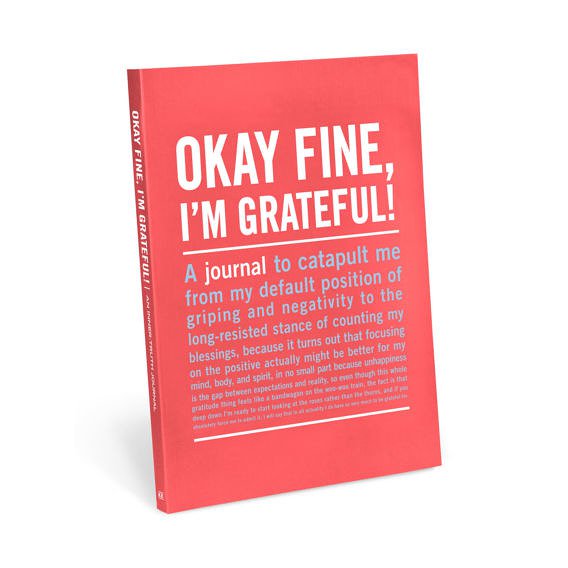
Or this "edgier" one for $16 from Knock Knock.
There are also a bunch of free apps for tracking gratitude.
Free Gratitude Journal Apps for Android:
- Zest
- Simple Gratitude Journal
- Attitudes of Gratitude Journal
- From Gratitude to Bliss
Free Gratitude Journal Apps for iOS:
- Gratitude Journal – The Original
- Grateful: A Gratitude Journal
- HappyFeed – Gratitude Journal
- hiMoment – Gratitude Journal
Start tracking your gratitude by telling us 3 good things about your day or 3 things about your life that you are grateful for. Don’t forget to use #4mind4body.
Read more about gratitude and positivity here.
Day 18
It’s #FitnessFriday, but fitness doesn’t have to be restricted to the gym.
MHA Staff were asked what they do to work activity into their lives outside of the gym. Here is what they said:
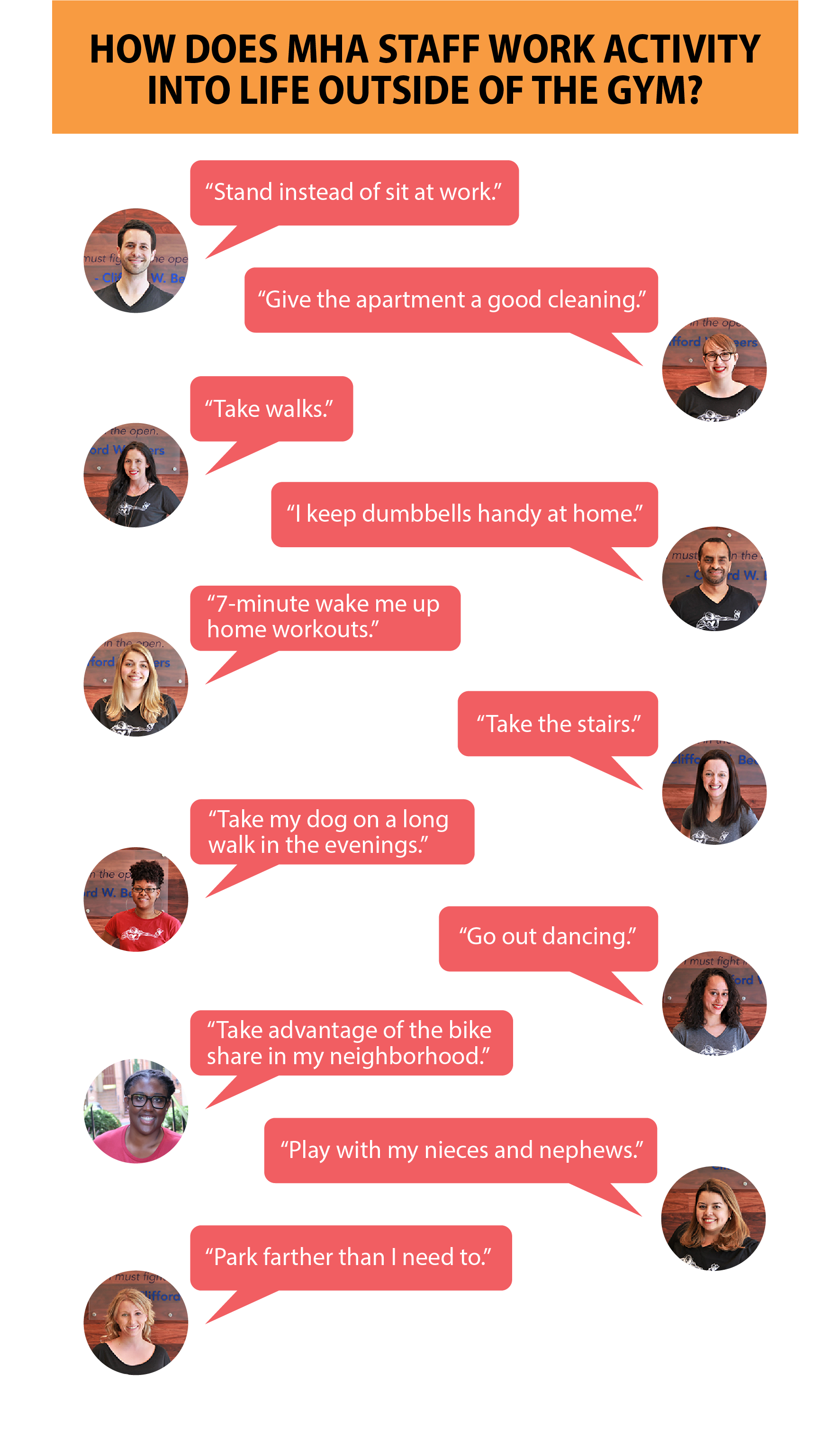
Tell us how you stay active outside of the gym with #4mind4body.
Day 19
Today’s #StressFreeSaturday challenge is about hobbies.
Hobbies allow us to relax and sort of “zone out” while doing something we find enjoyable. Hobbies can be physical like golf, gardening, or dancing, or they can be activities like writing, making music, crafting or cosplaying that provide an opportunity to flex our creative muscles. In addition to being great stress relievers, research shows that hobbies can have positive effects on overall wellbeing and activities like drawing, painting, and molding clay have been scientifically proven to help people who have been exposed to trauma.
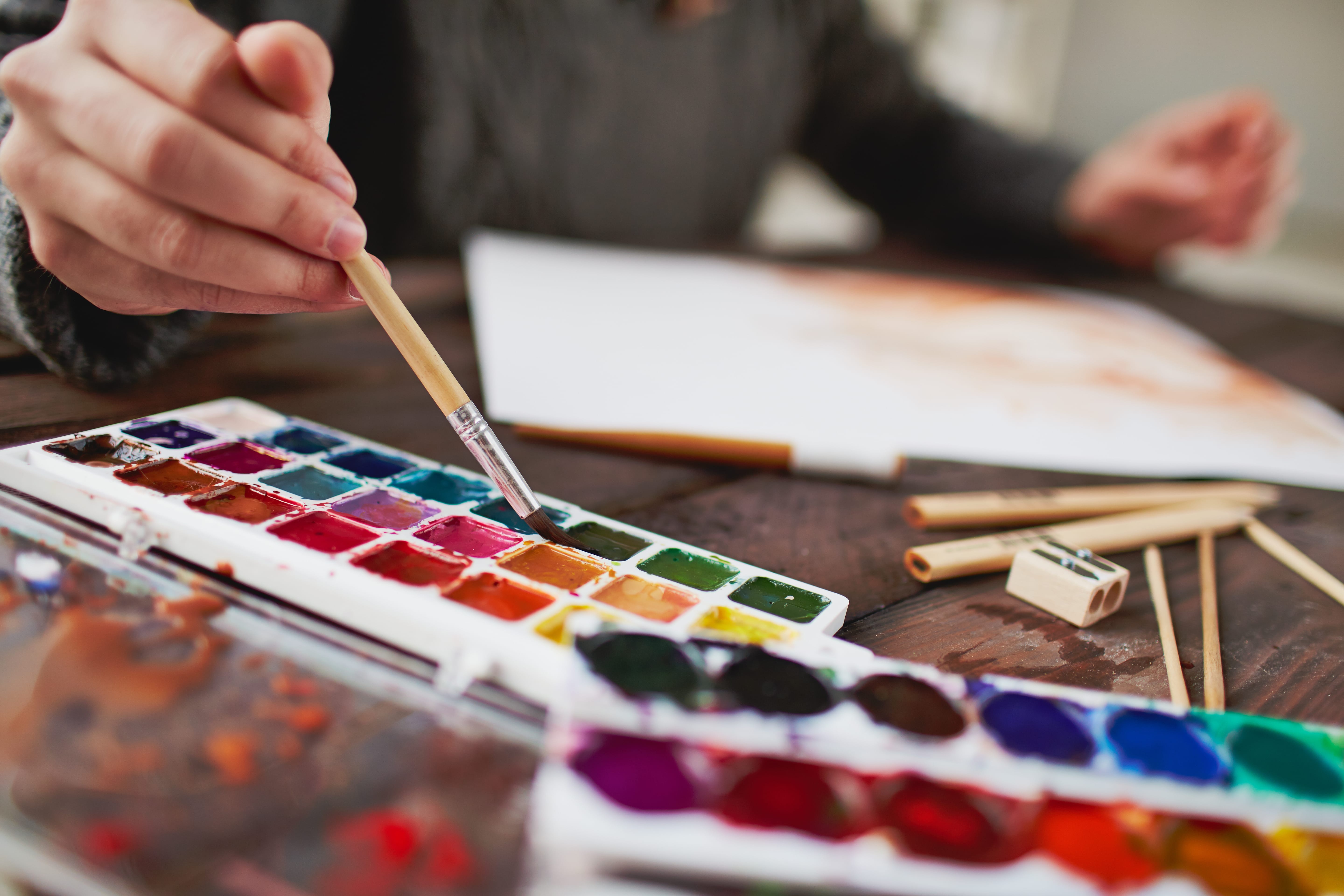
We want you to share your hobbies or show us how you get creative by posting with #4mind4body.
Day 20
We’re cutting down on screen time for #SleepWellSunday this week.
While all exposure to excessive amounts of light at night can interfere with the body’s natural clock and make it hard to sleep, the blue light wavelengths that come from smart phones, tablets, computers, and TVs are the most disruptive. As if interfering with sleep wasn’t bad enough, blue light-emitting devices can also cause eye strain. Read more about how blue light affects mental health on our blog.
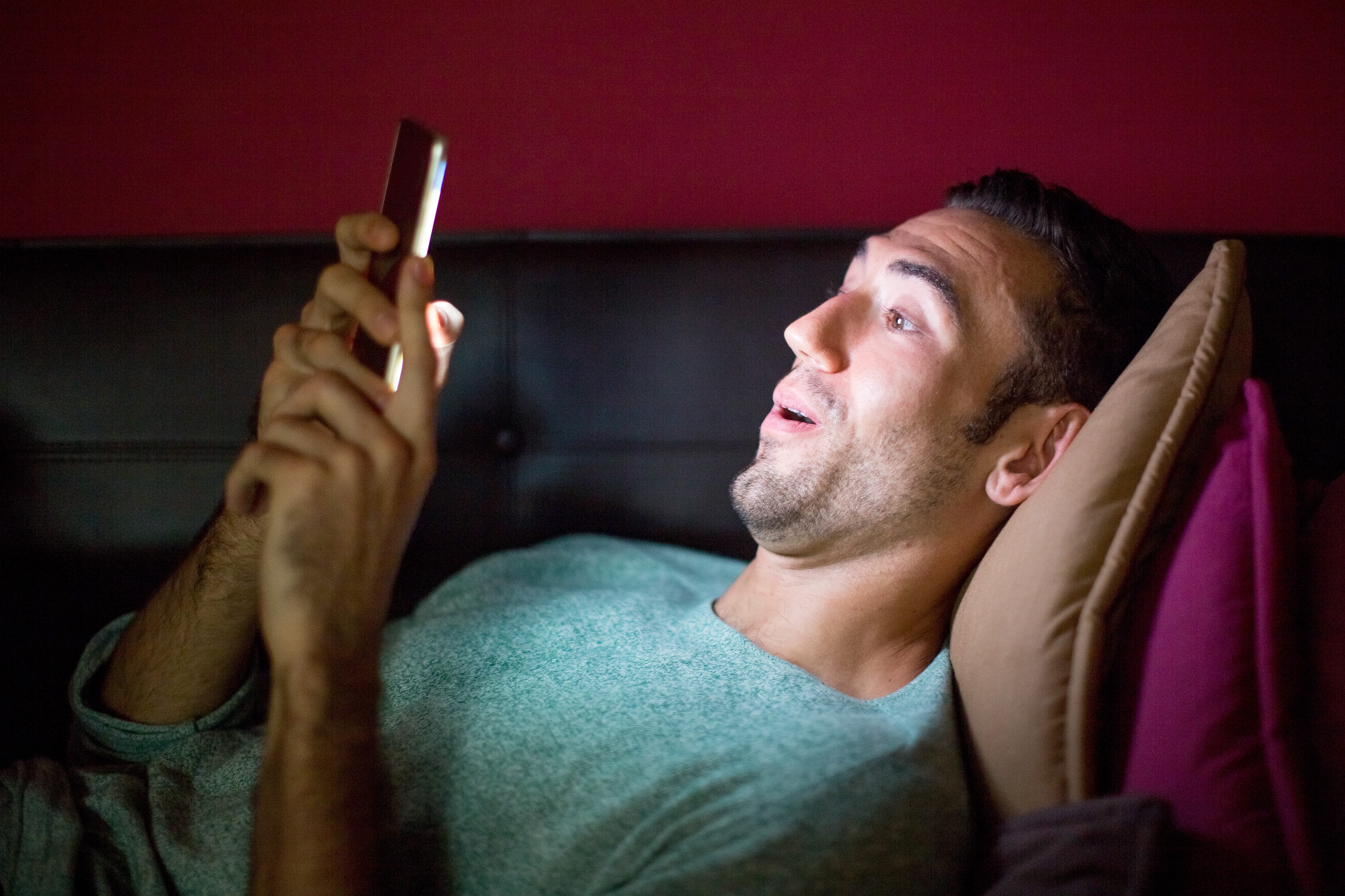
The good news is, there are ways to reduce blue light on certain devices.
- Go here for instructions on how to adjust the settings on your Mac, PC, iPhone or iPad.
- Go here for instructions on how to adjust the settings on a handful of Android smart phones.
You can also search the App Store or Google Play for one of the many free apps that act as blue light filters.
Blue light from screens can also be reduced with special glasses. Legacy Supply will donate a portion of the proceeds from each purchase of their Blue Light Computer Glasses to MHA.
We’re taking it a step further than just reducing blue light at night—today’s challenge is to cut out screen time 2 hours prior to bed. If one of your favorite shows comes on tonight, be sure to set your DVR to record it, or plan to watch it online some other time.
Tell us – Was this challenge really hard for you? Did it help you fall asleep faster? Don’t forget to use #4mind4body in your post!
Day 21
Are you ready for another #MindfulMonday?
Research indicates that people who practice mindfulness regularly experience benefits like reduced rumination (repeated thoughts about distress or problems without finding solutions), reduced stress levels, boosted working memory, increased focus, less emotional reactivity and more relationship satisfaction.

Guided meditations are a great way to practice mindfulness. Our friends at the UCLA Mindful Awareness Research Center have guided mindfulness meditations available in English and Spanish on their website at http://marc.ucla.edu/mindful-meditations.
Today’s challenge is to try one of these guided meditation activities, which range from 3-19 minutes long. Tell us which one you decided to try and share any other meditation resources you like to use by posting with #4mind4body.
Day 22
This #TastyTuesday is all about gut stuff.
Your gut is connected to your brain physically by the vagus nerve, and chemically through hormones and neurotransmitters. Inside of the gut are billions of bacteria that influence a variety of bodily functions. When you have a good system of bacteria in your gut, it helps your body and your mind to work their best. This short video from our partner, Amare Global, helps explain the connection.
Today’s challenge is to try a prebiotic or probiotic food. Send us a picture of your favorite gut-boosting food with #4mind4body.
Day 23
It’s #WorkplaceWednesday and we’re going to show you how to work out at work!
Check out this short video from our friend Annie Shiel and learn how to do yoga at your desk.
Chair yoga isn’t the only way of making activity part of your workday. Tell us how you work in physical activity at work with #4mind4body.
Day 24
For #ThoughtfulThursday this week we want you to show some love.
Showing a little love to the important people in your life make you and them feel good. Drue Metz, friend of MHA, film producer, and speaker at our 2018 Annual Conference is sharing why he thinks it’s so important to bring love into your life.
To help you show some love, MHA partner and artist Gemma Correll created the e-cards below. Post one (or more) and tag someone who you think could use a little pick-me-up. Remember to use #4mind4body.
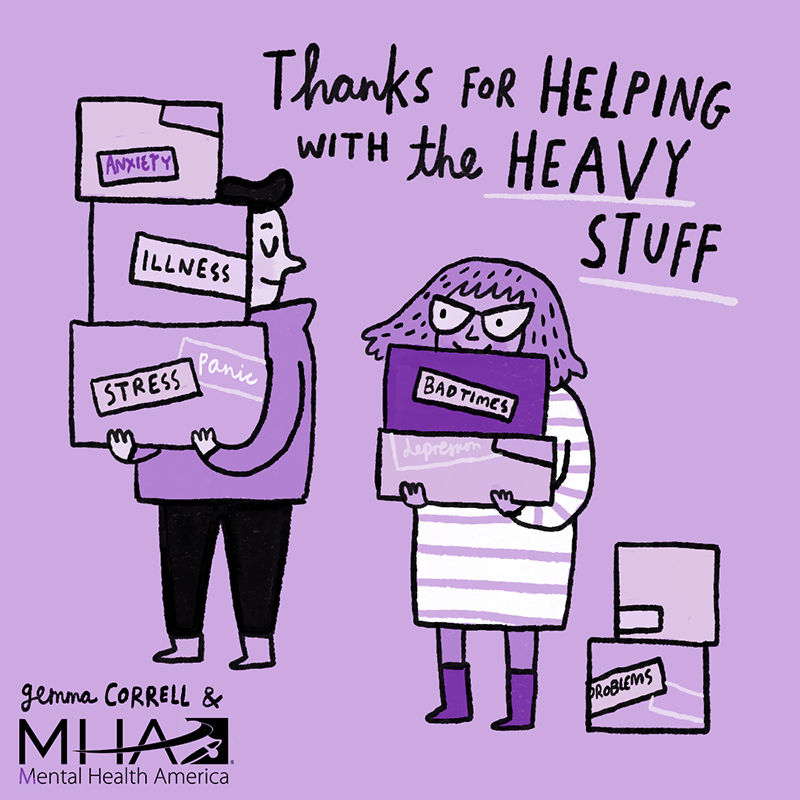
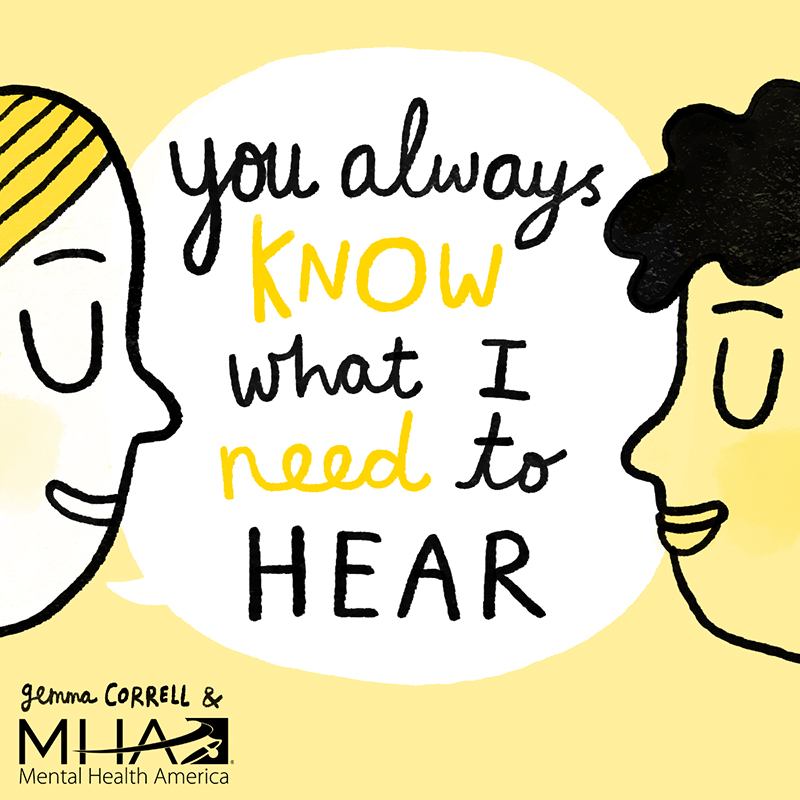
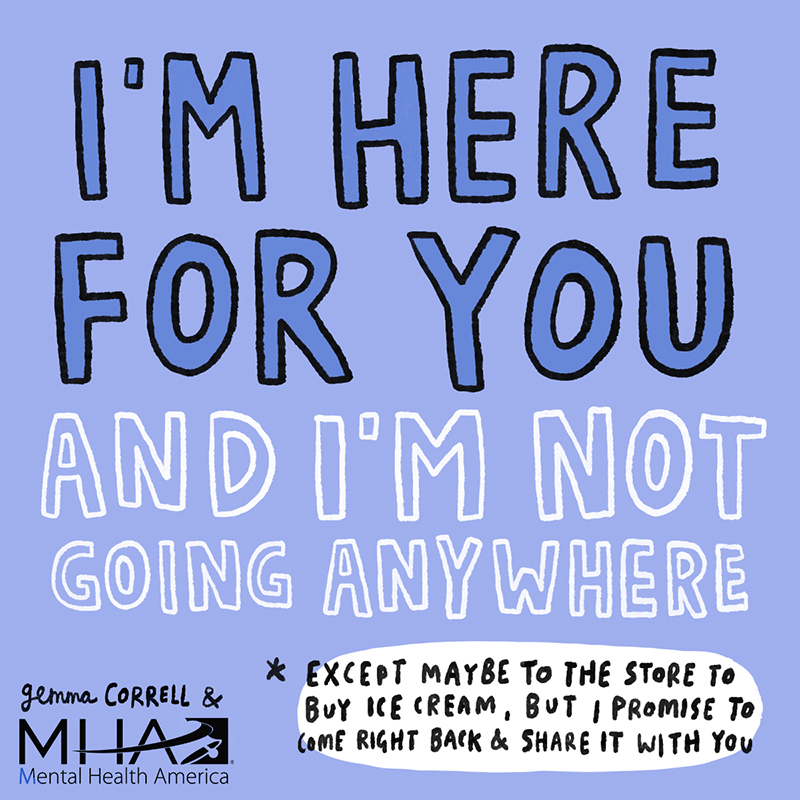
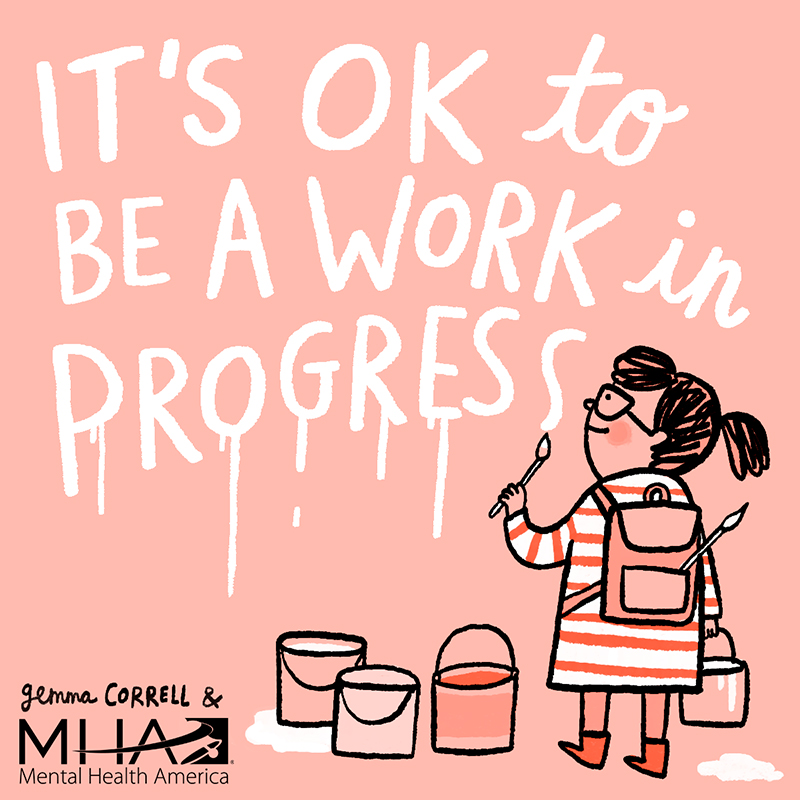
Day 25
#FitnessFriday is back already!
One great way of working fitness into your life is to get out into the great outdoors. Being in nature is also great for your mental health.
This week, musician, bike enthusiast, and mental health advocate, Rich Aucoin is telling us about his #PressOnTour to raise awareness of mental health issues and how being outside helps his mental health.
Today's challenge is to get outside and get active.Tell us your favorite place to do outdoorsy things with #4Mind4Body.
Day 26
We are all about animals this #StressFreeSaturday.
Recent research exploring the human-animal interaction for mental health has uncovered new benefits for stress, depression, post-traumatic stress and managing mental health in general.
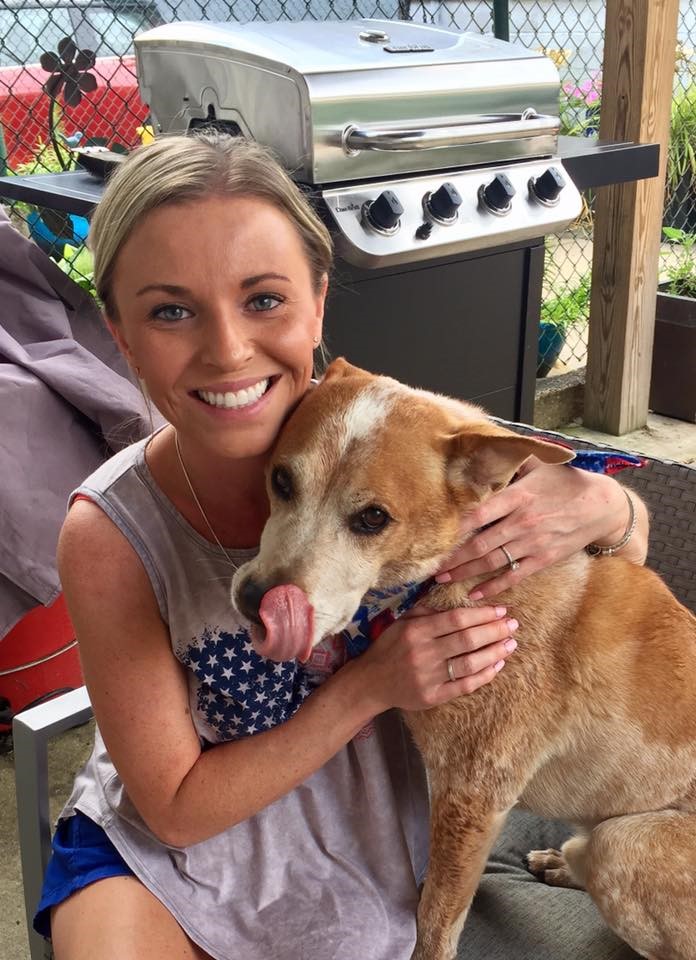
Check out more of the science supporting animal companionship for good mental health in this blog post from our friends at HABRI – The Human Animal Bond Research Institute.
Today’s challenge is to incorporate some animals into your life. Share a pic or video of your pet, or if you don’t have a pet-your favorite funny animal video from the internet, with #4Mind4Body.
Day 27
#SleepWellSunday can be tricky if you have trouble falling asleep.
MHA Staff were asked what they do when they have trouble sleeping. Here is what they said:
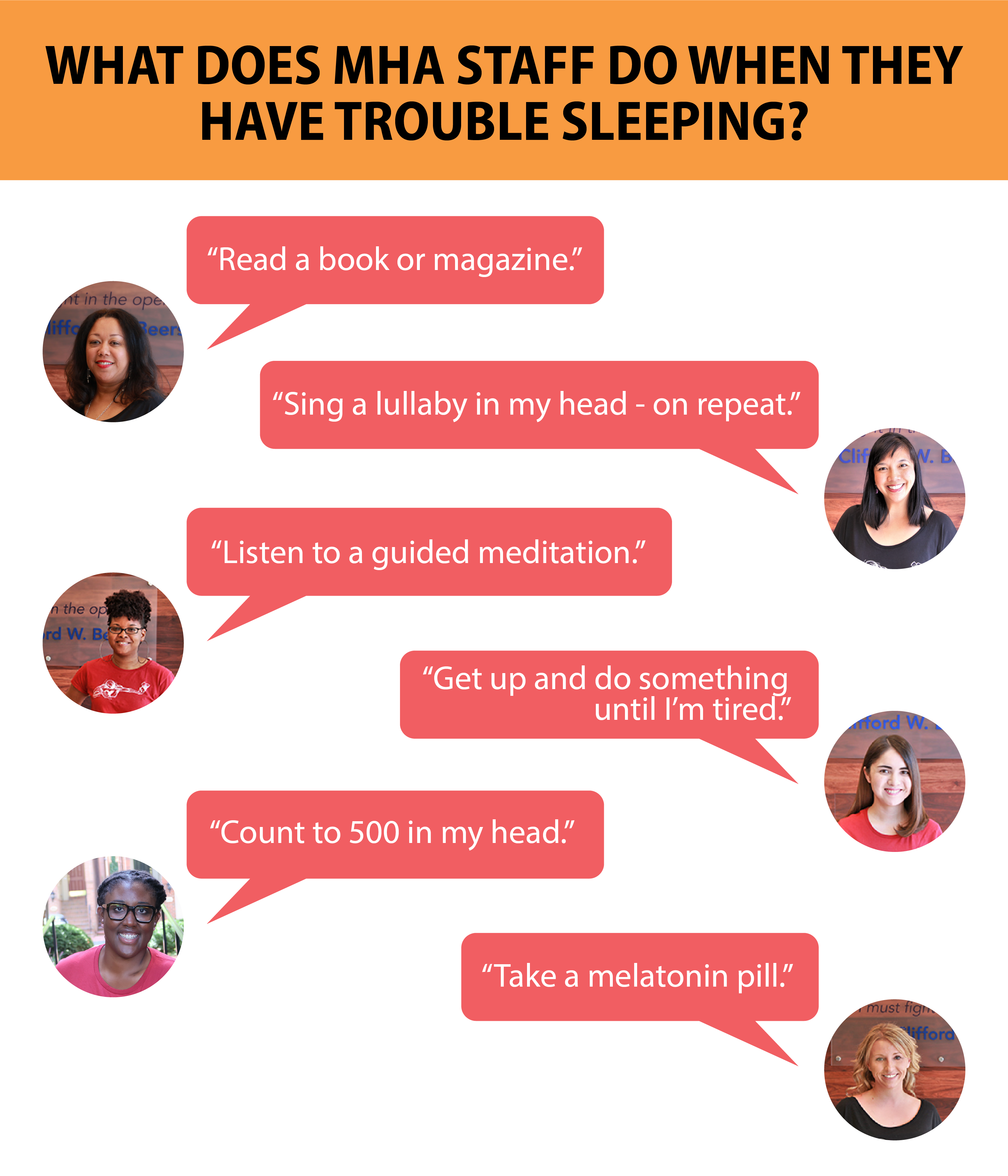
Challenge yourself to see if you can fall asleep in half an hour or less tonight.
What is your go-to hack to help yourself fall asleep? Post with #4Mind4Body.
See what we learned about sleep problems among people who took a screen at mhascreening.org.
Day 28
It’s the last #MindfulMonday of May!
Today's challenge is to try a grounding technique. Grounding helps reconnect you to the present moment and can be especially helpful if you find yourself stuck worrying a lot.
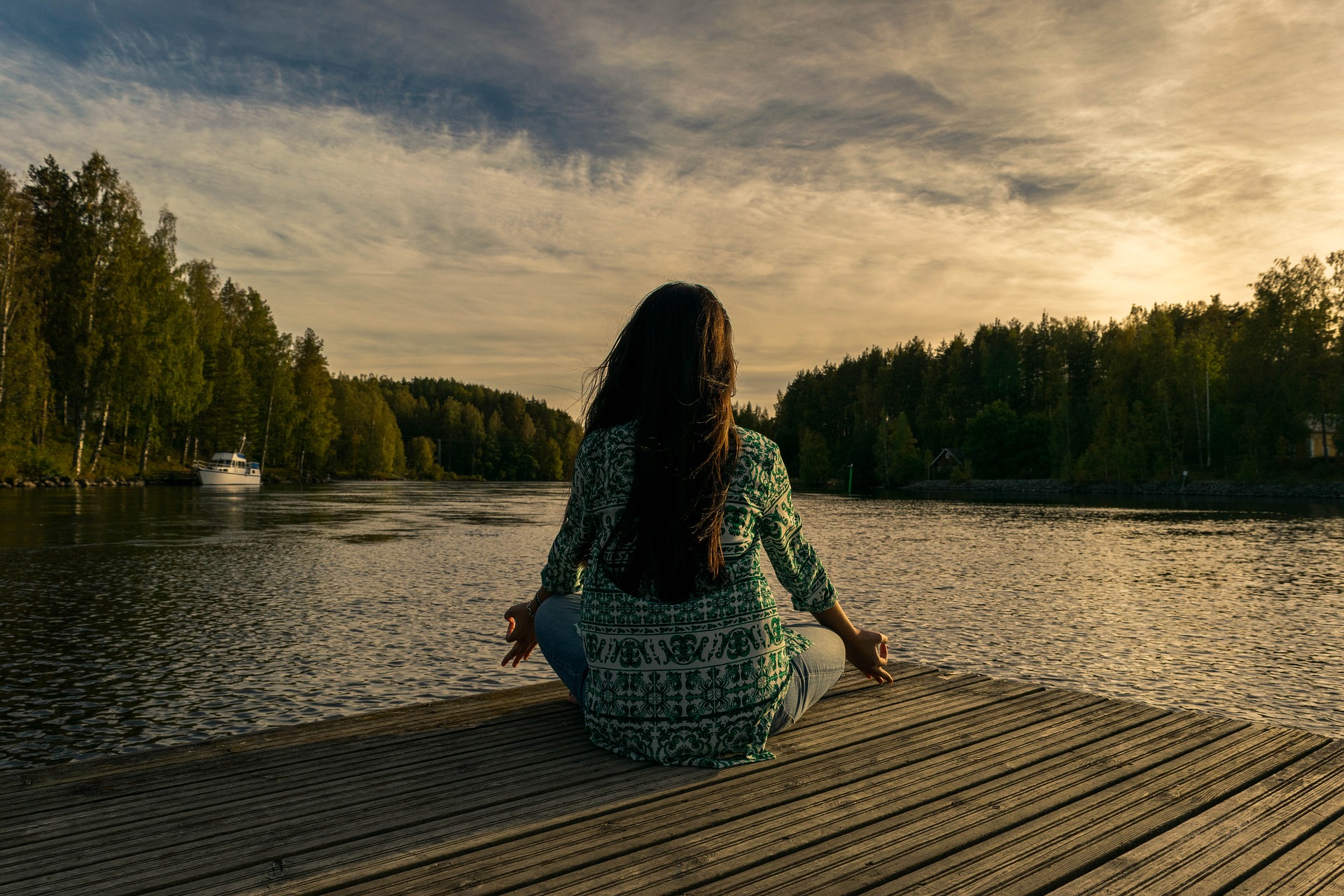
Before you try the technique, take your pulse/heart rate. Here are instructions from the folks at Harvard Health:
At the wrist, lightly press the index and middle fingers of one hand on the opposite wrist, just below the base of the thumb.
OR
At the neck, lightly press the side of the neck, just below your jawbone.
Each little pulse is a heartbeat. Look at a clock with a second hand and count the number of beats in 15 seconds, then multiply by four. That's your heart rate.
Now try this grounding technique.
When you are finished, take your pulse/heart rate again.
Share your heart rate from before and after the grounding exercise with #4mind4body.
May 29
Today's #TastyTuesday challenge is to make a meal that's good for your mental health for cheap.
The rules:
- $10 to spend on ingredients (not including olive oil or salt and pepper) to make one meal
- There must be a protein and vegetable component to the dish
- 3 ingredients from our Mental Health Grocery List (see Day 1) need to be included
- 20 minutes to cook
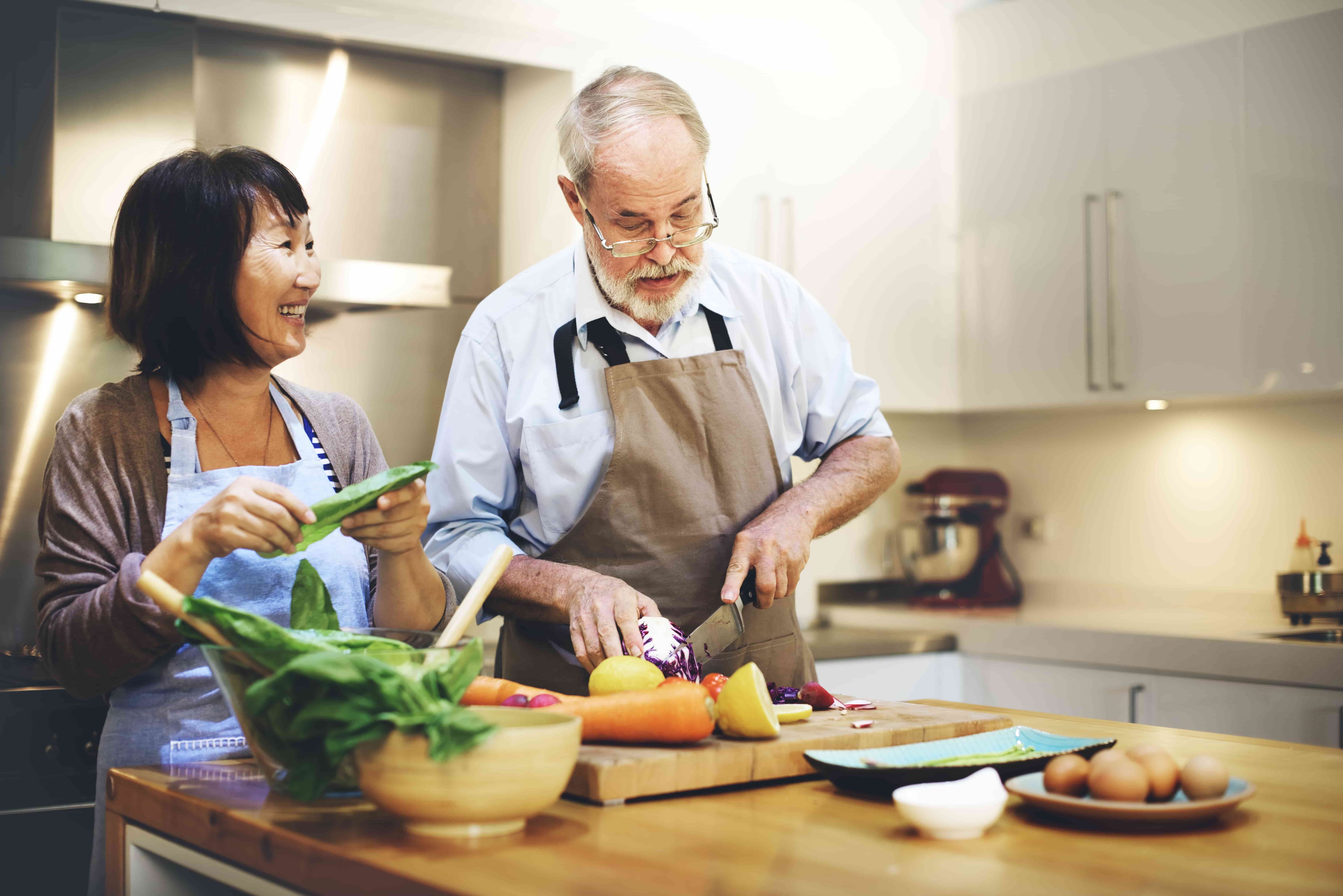
Show us what you came up with and tell us what your favorite cheap and healthy ingredients are with #4mind4body.
May 30
Time to step up your game for #WorkplaceWednesday.
Taking the steps instead of the elevator can be a good way to get exercise during your workday. If you need to be reminded about how exercise affects mental health, check this out.
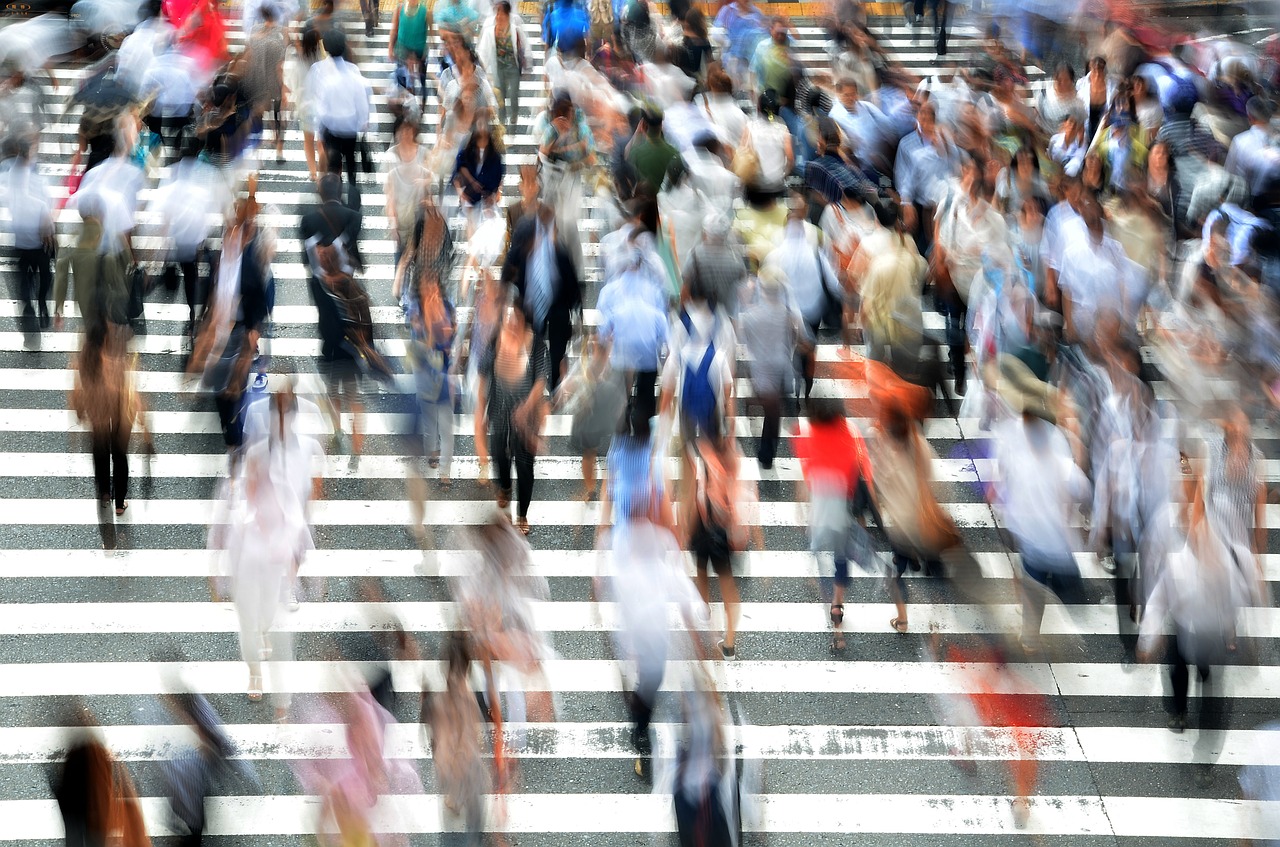
Today's challenge (if you are healthy enough) is to take the steps to your office. Let us know how many flights of steps or individual stairs you climbed today with #4mind4body. If your office is on the ground floor or you can’t do stairs – take a walk and let us know how many steps you took.
May 31
It’s #ThoughtfulThursday and also the last day of the #4Mind4Body Challenge.
We’re so proud of everyone who took this journey with us and really hope that you’re proud of yourselves as well.
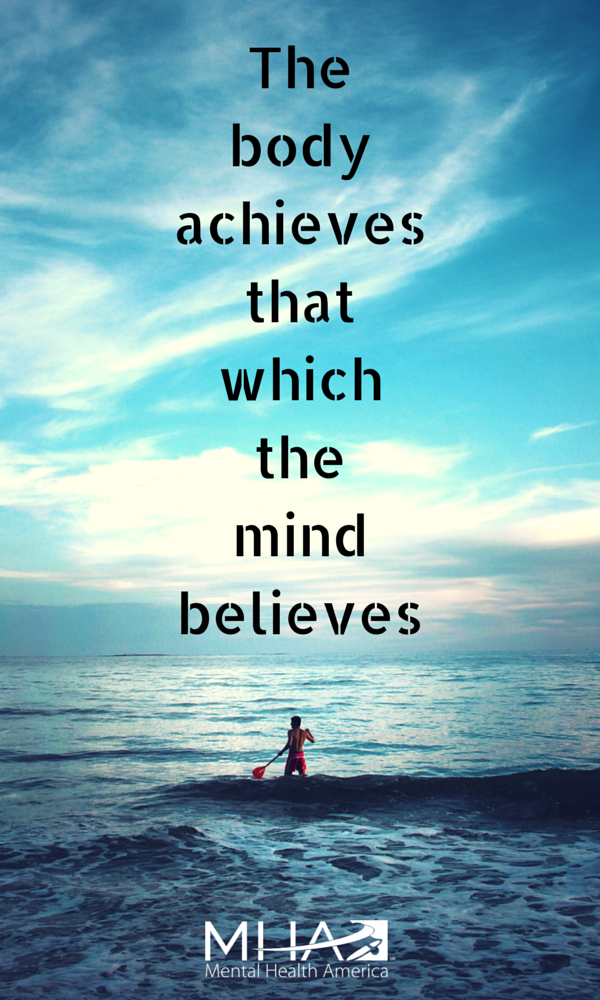
Your challenge for today is to take a moment to think about what your favorite part of the challenge was or if there was something you found particularly helpful.
Take a selfie and share how you feel about completing the challenge with #4mind4body.


